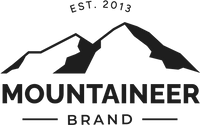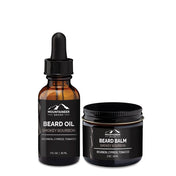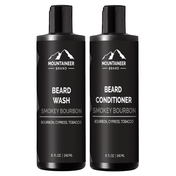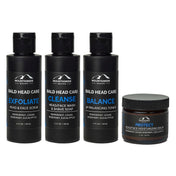“Why isn’t my beard growing?”
“How long will it take to grow a long beard?”
“Am I using enough of the product?”
This next one is the most commonly asked question of all…
“Do you have anything to make my beard grow faster?”
Well, the real answer to that question is a cold, hard, firm NO.
While that news may be very disappointing, we'd rather not be those people who give you false hope and empty promises. Since most businesses are in it to make a quick buck, they’ll tell you anything if it means that you’ll buy their snake oil. Just some friendly advice from our end… DON’T TAKE THE BAIT! Magic Beans aren’t all they’re cracked up to be, afterall.
There is absolutely no magic growth serum out there that is going to make your beard grow faster, thicker, or longer. Your body is going to do what it is designed to do on its own timing. It will, however, react to how you care for it.
Maybe that last paragraph has you tilting your head in confusion. “What does my body have to do with my beard?”
EVERYTHING. Your body has everything to do with your beard. In this blog you will find the real answers about what factors into the growth of your beard. Nothing is sugar coated. We have done all of the hard work for you, so get in your comfy reading chair and educate yourself.
FACTOR #1- Genetics

Every single person in this world- both men and women- have a predetermined length of hair called terminal length.
Terminal length is the longest length your hair will reach if you allow it to grow without trimming or cutting. Yes, that means your beard has a terminal length of its own, but that’s just the very tip of the genetic iceberg.
Let’s get into the more complicated stuff…
In an attempt to keep this as simple as possible, we’re going to narrow it down to the most important parts:
- Testosterone
- Dihydrotestosterone (DHT)
- Androgen Receptor
When testosterone enters the bloodstream, some of it is converted into dihydrotestosterone (DHT) by the enzyme 5a-reductase. DHT is much stronger than testosterone because it binds to the androgen receptor. When they meet, a biological response is produced.
Are you yawning yet? Hang on, it gets better. Now we’ll see where genetics play their biggest role.
The androgen receptor serves as a transcription factor. The transcription factor is a powerful protein that controls the rate at which genetic information is processed and has the ability to either turn specific genes on or off, including the one responsible for facial hair.
You’re probably hoping that your androgen receptor will transcribe your genetic info and flip all the “on” switches that lead to bearded greatness, but it’s just not that simple. What it boils down to are the genes that have been passed to you. If your father has had a full, lucious beard since his 21st birthday, the odds are likely in your favor. If he doesn’t have a beard, ask if he has ever made an attempt to grow one and how the experience was for him. It may have looked great and just wasn’t his thing. You can also reach out to other male relatives, like uncles and cousins, for more information that may be helpful.
If we put you to sleep with this biology lecture, it’s time to wake up; we’re moving on to the easy stuff.
FACTOR #2- Ag
 A lot of men in their early 20’s want to know why they don’t have the beard of Zeus and how they can speed up the growing process. Remember we talked about DHT and androgen receptors? Ha, we knew you wouldn’t forget!
A lot of men in their early 20’s want to know why they don’t have the beard of Zeus and how they can speed up the growing process. Remember we talked about DHT and androgen receptors? Ha, we knew you wouldn’t forget!
Early to late 20’s is when most beards begin growing at a more rapid rate. This is because the production of DHT and AR sensitivity reach their peak, hopefully making your beard growing dreams come true.
Young men, patience is a virtue, so hang in there!
FACTOR #3- Using the Wrong Products
Not all products are good for your beard, take a look:
One of the biggest culprits of beard damage is shampoo. So many men grab whatever shampoo is within reach and lather up their beard without a second thought, but this is BAD. So bad. Flip the bottle over sometime and take a look at the ingredients. We’re willing to bet that one of them is Sodium Lauryl Sulfate, which is a synthetic detergent that makes the product lather.
Did the word “synthetic” trigger any alarms? If not, we’ll tell you why it should.
Synthetic ingredients are responsible for stripping the skin beneath the beard of the oils it naturally produces. These oils are what make your beard thrive, so you don’t want to shoo them away. That’s why it’s important to remember that your facial hair is a completely different ballgame and should be treated as such.
Another thing we suggest is avoiding oils and balms that contain fragrance oils. Again, this causes the skin to be stripped of its natural oils, which will dry out your beard. It seems impossible to damage your beard with something that’s meant to moisturize it, but in most cases, the damage is inevitable. Your best bet is to find a company that uses essential oils to add scent to their product line.
Finally, avoid any products that add pigment to your facial hair. These can cause serious skin damage that may lead to dryness, itching, hair loss, or chemical burn.
The bottom line is that you want to use gentle products to care for your beard and skin. Be kind to them and they will be kind to you.

So, we’re about to wrap up this post, but before we do, let’s look back at something we mentioned in the beginning… your body will react according to how you care for it. Below we have listed some things you can do that will benefit your beard growing journey, but more importantly, your body as a whole.
- IF YOUR GENES AREN’T BUILT FOR IT, the main thing you can do is increase your testosterone levels. You can do this naturally by:
- Regular exercise, especially weight lifting
- Eating a well-balanced diet of protein, carbs and fats
- Getting plenty of rest and reducing stress
- Avoiding nicotine. Scientific studies have proven that long term smoking reduces testosterone levels.
- Be Patient. You may not have the beard you yearn for now, but hang in there. Some people blossom later than others. You’ll have your time to shine!
- Avoid using any product that is not 100% natural. Damaging your beard with chemicals will prevent it from growing to its full potential, and who doesn’t want that?
Beard growing isn’t for the faint of heart. It’s a process that requires a lot of thought, patience, dedication, and understanding, but we have faith in your ability to grow the best beard your genes will allow. You’ve got this, man. We’re in your corner!
Check out these success stories on beards.org from men who put forth the effort and dedication necessary to achieve bearded greatness.
Wilderer PA (1 September 2010). "Bioassays for Estrogenic and Androgenic Effects of Water Constituents". Treatise on Water Science, Four-Volume Set. Newnes. pp. 1805–. ISBN 978-0-444-53199-5.
Melmed S (2016). Williams Textbook of Endocrinology. Elsevier Health Sciences. pp. 621, 711. ISBN 978-0-323-29738-7.
Morrison MF (4 May 2000). Hormones, Gender and the Aging Brain: The Endocrine Basis of Geriatric Psychiatry. Cambridge University Press. pp. 17–. ISBN 978-1-139-42645-9.
Roy AK, Lavrovsky Y, Song CS, Chen S, Jung MH, Velu NK, Bi BY, Chatterjee B (1999). Regulation of androgen action. Vitamins and Hormones. Vitamins & Hormones. 55. pp. 309–52. doi:10.1016/S0083-6729(08)60938-3. ISBN 978-0-12-709855-5. PMID 9949684.
Mooradian AD, Morley JE, Korenman SG (February 1987). "Biological actions of androgens". Endocrine Reviews. 8 (1): 1–28. doi:10.1210/edrv-8-1-1. PMID 3549275.
"The No-Hair Scare". PBS. Archived from the original on 2009-02-05. Retrieved 2009-02-20.
"Household Products Database – Health and Safety Information on Household Products". nih.gov. Retrieved 13 March 2016.
Lana Barhum (2018-07-18) How Do You Boost Testosterone Naturally? medicalnewstoday.com.




